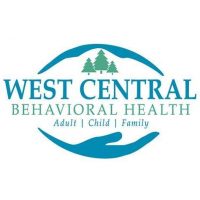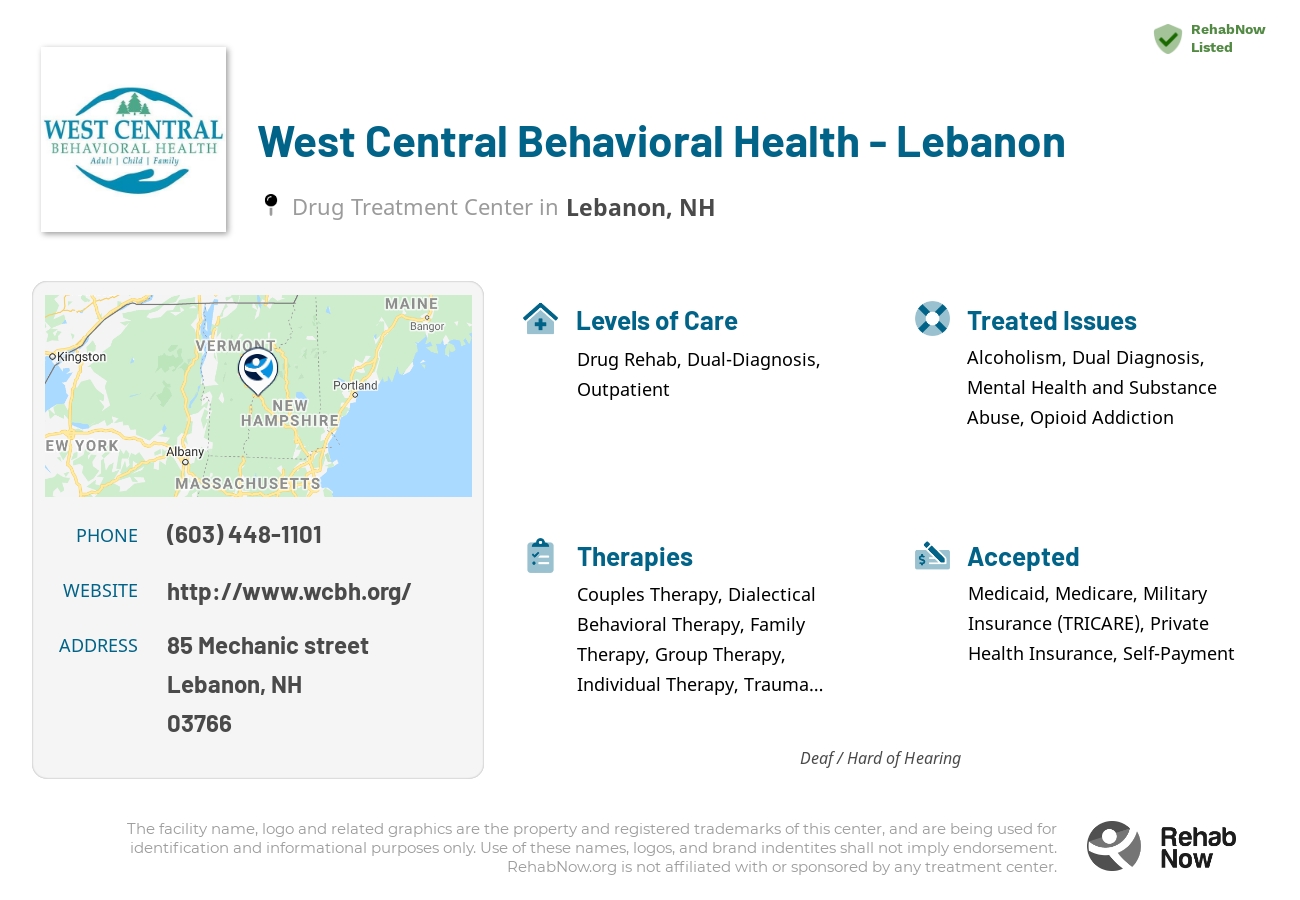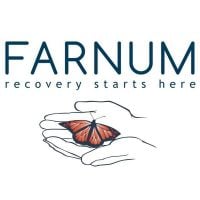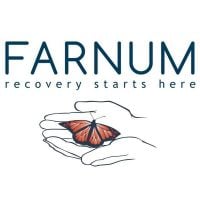West Central Behavioral Health - Lebanon
Drug Rehab Center in Lebanon, New Hampshire
West Central Behavioral Health in Lebanon, New Hampshire is a licensed and accredited behavioral health facility that provides comprehensive care for mental health, substance abuse, and co-occurring disorders, and offers services including counseling, referrals, support groups, crisis intervention, and medication management.
About West Central Behavioral Health - Lebanon in New Hampshire
West Central Behavioral Health - Lebanon is a comprehensive behavioral health facility located in Lebanon, New Hampshire. They specialize in providing individualized quality care for mental health, substance abuse, and co-occurring disorders. West Central Behavioral Health - Lebanon has been serving the community for over 40 years and has a licensed, experienced clinical staff that provides innovative, evidence-based treatments to individuals and families that seek help.
At West Central Behavioral Health - Lebanon, they provide a wide range of services to help individuals recover from addiction and substance abuse. This includes counseling, referrals, support groups, and an intensive outpatient program (IOP) that provides comprehensive treatment to those who need more comprehensive care. They also offer outpatient and inpatient detoxification services, crisis intervention and medication management. West Central Behavioral Health - Lebanon also provides aftercare planning so that clients can remain on the path to recovery long after they have completed treatment.
West Central Behavioral Health - Lebanon is accredited by the Commission on Accreditation of Rehabilitation Facilities and licensed by the New Hampshire Department of Health and Human Services. This ensures that their facility meets and exceeds the highest standards for safety, quality of care, and professional staff. They are also recognized by the National Institute on Drug Abuse for their commitment to providing the highest quality of care for persons suffering from substance abuse and addiction. In addition, West Central Behavioral Health - Lebanon is a member of the National Association of Addiction Treatment Providers and is also certified by the New Hampshire Behavioral Health Services.
Genders
Ages
Modality
Additional
Conditions and Issues Treated
Opioid addiction is when someone becomes addicted to opioids. This can happen quickly due to any opioid use. Opioid withdrawal can be uncomfortable and lead the user to continue using even if they want to quit. It’s best to receive inpatient treatment for detoxification.
Even if a person doesn’t need inpatient treatment, it’s recommended to start rehabilitation or at least some kind of outpatient treatment. This is because the withdrawal symptoms from opioids can be uncomfortable and unpleasant, to the point that a person could end up using again or worse.
Detoxification should be done to break the physical addiction of opioids. This can be done with opioid replacement therapy, medication-assisted therapy, or a more traditional detoxification program. Intensive outpatient treatment is a form of addiction care that allows patients to continue living at home while undergoing treatment. This type of care is appropriate for patients who have been treated in residential treatment programs. Intensive outpatient programs include regular visits to the facility providing therapy, and patients gradually return to their routine life. IOP benefits most when patients have a supportive family member or friend to help them recover.
The first step to getting into an intensive outpatient program is to attend a detoxification facility. Detoxification facilities are designed to remove substances from the body safely. The patient will attend sessions designed to help them understand their addiction and its impact on their lives. While in an intensive outpatient program, therapy sessions are scheduled three to five times per week, with the patient attending no more than two sessions in one day.
Dual Diagnosis therapy is considered more successful than traditional rehab methods because it treats the addiction and the underlying mental health disorder simultaneously. This comprehensive approach gives Lebanon, NH patients the best chance for long-term recovery. If the patient does not receive treatment for both conditions, they are more likely to relapse.
Levels of Care Offered
This center offers a variety of custom treatment tailored to individual recovery. Currently available are Drug Rehab, Dual-Diagnosis, Outpatient, with additional therapies available as listed below.
Outpatient treatment consists of counseling and therapy sessions. The outpatient treatment process begins with the addict’s initial detox period, lasting about ten days. Outpatient treatment is used for those who are at moderate risk for “slipping back” into the addiction. It is also used for those who are not currently experiencing any side effects from withdrawal, can handle social pressure, have a stable living environment, and have a good support system.
Therapies & Programs
Individual Therapy is a crucial component of addiction recovery. Therapists work with patients to identify the root of their addiction and figure out how to better handle the issues that led to them using drugs. Individual Therapy is one on one sessions where people meet with their therapist. Individual therapy provides a safe space for people to open up and discuss personal and sensitive topics which they may not feel comfortable discussing in a group setting.
In this type of therapy, therapists can develop specific solutions for each patient, which helps speed up their recovery process. In addiction recovery, therapy is a crucial part. It allows patients to go deep into their core issues and discover how those problems can be better handled now. Therapy can be performed in individual sessions as well as group settings. In individual therapy for addiction, the patient meets with the therapist one-on-one to focus on the underlying issues of addiction and come up with solutions to prevent future abuse.
Addiction can take a heavy toll on relationships, damage the trust and intimacy that was once there. Couples therapy at West Central Behavioral Health - Lebanon helps to rebuild the trust and intimacy that has been damaged. An intimate relationship with a drug addict is not healthy for children or anyone in the family. Therapist help to rebalance family roles and create a healthier environment after rehab in Lebanon, NH.
Family therapy is a crucial part of drug treatment and getting sober. It is one of the most effective ways to help addicts stay on the path to long-term sobriety. One of the most important parts of family therapy is the relapse prevention plan. During treatment, therapists and doctors will often sit down with the addict and their family to develop a plan if the addict ever feels like they want to use again. This plan should involve steps the addict and family can take together to prevent them from relapsing in the future.
An addict’s family can play a vital part in helping them to avoid relapse because they can spot the warning signs and help them get back on track before it becomes too much of a problem. Family therapy is one of the most effective ways to help addicts stay on the path to long-term sobriety.
Group Therapy is employed by drug treatment centers like West Central Behavioral Health - Lebanon to provide the recovering addict with a platform to talk about their feelings and experiences. It also provides for an opportunity to learn from other addicts who have successfully overcome their addiction. It is recommended that all group members be recovering addicts for this type of therapy to work.
This type of therapy involves the use of a variety of therapeutic techniques to help addicts recover from past traumas that might have triggered their substance abuse. During these sessions, therapists will work with the addict to address painful memories and learn how to cope effectively with stressors as they arise.
During these types of sessions, therapists will typically focus on three main goals:
- Identifying and expressing painful emotions associated with past traumas.
- Reducing the effects of stress on an addict’s life by developing more effective coping mechanisms.
- Developing healthy ways of thinking about stressful situations that can help addicts avoid substance abuse issues in the future.
This type of therapy is typically used in conjunction with other types of addiction treatment services. By identifying and dealing with the root cause of addiction, most addicts can overcome their cravings and prevent relapse once they leave rehab.
Many different types of addiction treatment services exist to help addicts safely get sober, but it’s important for recovering individuals to find a therapist or support group that will help them address the root cause of their addiction.
Dialectical behavior therapy (DBT) is a type of cognitive behavioral therapy that is focused on helping those with problematic behaviors caused by intense emotions and thoughts control and regulate their emotions and behavior.
Dialectic Behavior Therapy is beneficial for:
- People who have chronic suicidal thoughts and behaviors
- People who have chronic drug cravings
- People who have difficulty establishing and maintaining personal relationships
- People who have a mental disorder such as Borderline Personality Disorder
- People who have experienced trauma in their life
Cognitive Behavioral Therapy (CBT) is an approach and method in psychotherapy. West Central Behavioral Health - Lebanon asks people to investigate how their thoughts, including habitual, harmful, and inaccurate ways of thinking, affect behaviors. CBT is based on the idea that rigid, inflexible ways of thinking cause people to have a limited ability to cope with stress, which leads to emotional distress.
Likewise, CBT helps people identify maladaptive behaviors and replace them with more positive behaviors. It makes you look at the way you perceive something and ask: Is this a realistic belief? CBT asks people to look at the role of behaviors and emotional responses and how they may be distressing in one’s life. The goal of CBT is to change the way people think and behave to achieve a more balanced, healthier lifestyle.
Moreover, CBT has been shown to reduce some types of anxiety disorders, depression, and symptoms related to thoughts or actions that are considered harmful.
Payment Options Accepted
For specific insurance or payment methods please contact us.
Is your insurance accepted?
Ask an expert, call (888) 674-0062
West Central Behavioral Health Associated Centers
Discover treatment facilities under the same provider.
Learn More About West Central Behavioral Health Centers
Additional Details
Specifics, location, and helpful extra information.
Lebanon, New Hampshire 3766 Phone Number(603) 448-1101 Meta DetailsUpdated November 25, 2023
Staff Verified
West Central Behavioral Health - Lebanon Patient Reviews
There are no reviews yet. Be the first one to write one.
Lebanon, New Hampshire Addiction Information
Opioids such as fentanyl, heroin, and prescription opioids form the largest drug threat in New Hampshire. More than 80% of all New Hampshire treatment centers admissions were related to one or more of these three drugs. Opioids such as fentanyl, heroin, and prescription opioids form the largest drug threat in New Hampshire. Since 2002, rates of alcohol dependency have also been among the highest in the country. In 2015, almost 15% of the residents were admitted to treatment centers for alcohol abuse.
Almost 8% of residents in Lebanon, New Hampshire are abusing alcohol or suffering from a form of drug addiction. Drugs such as marijuana, heroin, opioids, cocaine, or methamphetamines are common in Lebanon. 18% of children in Lebanon live with at least one parent who is a binge drinker. 38% of homicides in Lebanon were related to the use of drugs. Drug rehab facilities and 12-step programs are available in Lebanon.
Treatment in Nearby Cities
- Jefferson, NH (66.5 mi.)
- Peterborough, NH (55.3 mi.)
- Hillsborough, NH (40.6 mi.)
- Merrimack, NH (65.7 mi.)
- Warren, NH (26.8 mi.)
Centers near West Central Behavioral Health - Lebanon
The facility name, logo and brand are the property and registered trademarks of West Central Behavioral Health - Lebanon, and are being used for identification and informational purposes only. Use of these names, logos and brands shall not imply endorsement. RehabNow.org is not affiliated with or sponsored by West Central Behavioral Health - Lebanon.










